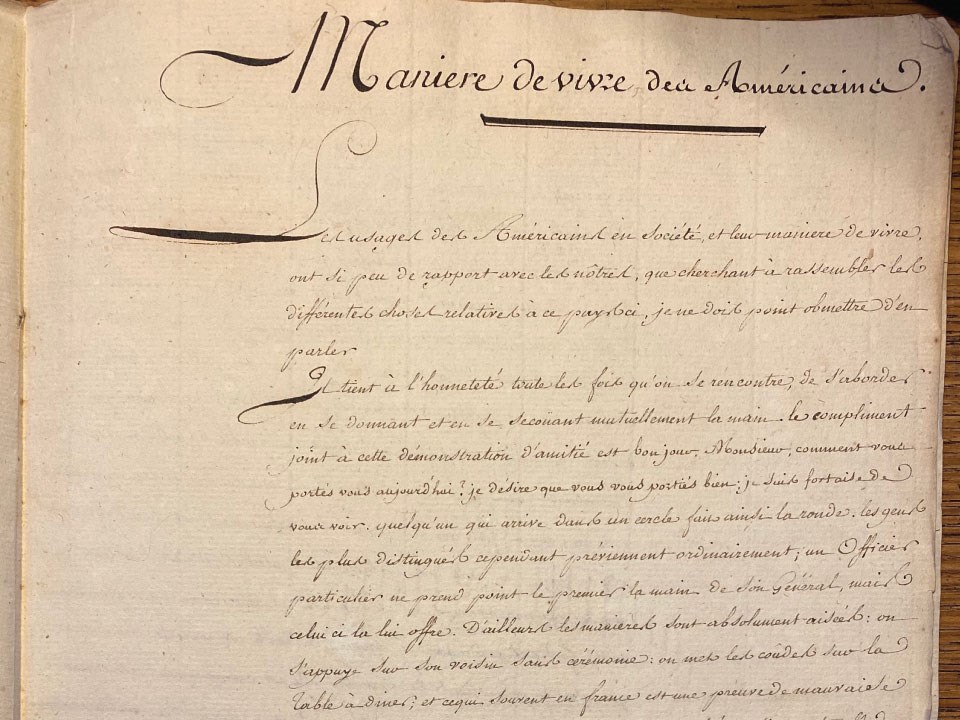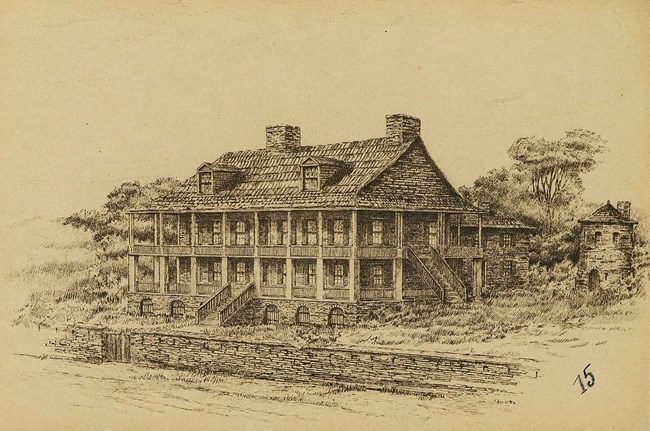Part of a series of articles titled French Language and the Lewis and Clark Expedition.
Article
French Opinion of American Society in Early 19th Century

Sophia Adams; Paris, France at the Archives Nationales;
This article is one in a series, French Language and the Lewis and Clark Expedition, by Lewis and Clark Trail Digital Interns.
The French have been one of America’s strongest allies since the days of the Revolutionary War. Considering the French population in America was quite large by the early 19th century when Lewis and Clark were starting their expedition, it’s only natural that the French — Canadian settlers and Europeans alike — would develop an opinion of both the United States and the people they encountered there. The French had an overall positive opinion of America in the early 19th century. This is evident in sources including a document from an anonymous French officer in the early 1800s. The report, which is held at the Archives Nationales in Paris, describes Americans’ friendly and boisterous attitudes and tendency to spend many hours a day eating. Even today, stereotypes about Americans today reflect those early opinions from the French.
In general, French officials who visited the United States at the start of the 19th century enjoyed both the country and the company. The anonymous officer wrote that the Americans “stay honest every time we meet, to reach out willingly and while shaking hands” (Anonymne, p. 1, translated). Furthermore, he remarked with surprise that whenever one meets an American, they start a conversation by asking “how are you doing today” and “I feel fortunate to see you today” (Anonymne, p. 1, translated). Although these manners are the social norm today, it seems that the author was surprised that Americans would always greet one another in such a way. At the time, French society was extremely hierarchical, so one only spoke with other members of their class and the French highly valued rituals like a proper introduction. In contrast to their rigid societal rules, the French travelers seem to have appreciated the Americans’ openness and friendliness.
This surprised attitude extended to Americans’ dietary behaviors. The anonymous document continues for two pages about the settlers’ eating habits. He writes that Americans spend “the majority of their life at the table” (Anonymne, p. 1, translated). Their spirit of cheer was shown during meals that lasted hours at a time over several courses. American table manners were also questionable for the Frenchman, who was astonished to see them using the tablecloth as a napkin and serving themselves before others. At one point, he even said that he found the Americans so relaxed that he’s surprised they fight as well as they do.

Clarence Hoblitzelle; St. Louis, Missouri; photograph date uncertain, drawing 1897. Missouri Historical Society.
Although the French saw American society as different from theirs, including an all-around more relaxed atmosphere, it’s clear that they valued each other and were willing to work together. This is shown in the Lewis and Clark expedition, which involved the participation of a number of French-Canadian explorers and tradesmen, including Toussaint Charbonneau, George Drouillard, and brothers Rene-Auguste and Jean-Pierre Chouteau.
Many early opinions that French visitors and colonists had on Americans and their way of life have continued into modern day relations. The United States still has a reputation for being vibrant and hospitable. Not to mention, there is a lasting stereotype about the United States being a country of overeaters; the Center for Disease Control reports that the obesity rate in 2018 was 42.4% among adults (Center for Disease Control, 2021). Whatever else the French thought of Americans over two centuries ago, one of the most telling predictions is from one French officer who wrote that the US could be “the most powerful empire in the entire world” (Nicolai, p. 126).
Bibliography
“Adult Obesity Facts.” Centers for Disease Control and Prevention, Centers for Disease Control and Prevention, 30 Sept. 2021, www.cdc.gov/obesity/data/adult.html.
Anonymne. (XVe-XIXe siècle). “Manière de vivre des Américains.” Papiers provenant des sous-séries supprimées F/40/I (Guerre), F/50 (Marine et Colonies) et F/60 (Affaires étrangères). Paris, France; Archives Nationales.
Nicolai, Martin L. “Trade, Colonies, and State Power: French Officers’ Economic Views on French and English America, 1755-1783.” Proceedings of the Meeting of the French Colonial Historical Society, vol. 19, Michigan State University Press, 1994, pp. 111–27, http://www.jstor.org/stable/43007768.
Last updated: May 12, 2022
